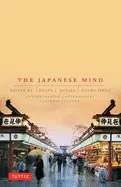
Japanese Mind - by Roger Davies and Osamu Ikeno
ISBN: 0804832951Date read: 2022-10-20
How strongly I recommend it: 6/10
(See my list of 430+ books, for more.)
Go to the Amazon page for details and reviews.
Good description of the Japanese mindset and its origins.
my notes
People had to cooperate in this society because they could not grow rice without one another’s help, and if they worked together, they were able to grow more.
If people sacrificed themselves and worked for the group, the group supported them, so they made their own opinions conform with their group’s objectives and felt a comfortable sense of harmony.
Rule of the unanimous.
To live without creating any serious problems for the group’s harmony, people avoided expressing their ideas clearly, even to the point of avoiding giving a simple yes or no answer.
If a person really wanted to say no, he or she said nothing at first, then used vague expressions that conveyed the nuance of disagreement.
They think that it is unnecessary to speak clearly as long as their partner is knowledgeable.
To express oneself distinctly carries the assumption that one’s partner knows nothing, so clear expression can be considered impolite.
Silence indicates deep thinking or consideration.
Empty space, full of meaning, is fundamental to the Japanese arts and is present in many fields, including painting, architecture, music, and literature.
Use of ambiguity.
Zen contributed enormously to building the Japanese character.
Zen Buddhism influence is apparent in every aspect of the lives of the people of modern Japan.
Zen Buddhism stressed physical discipline, self-control, and the practice of meditation in place of formal scholarship.
Bushidō involved absolute loyalty to one’s lord, a strong sense of personal honor, devotion to duty.
Silence can be a matter of saying nothing and meaning something.
Silence is a kind of virtue similar to truthfulness.
What is important and what is true in Japan will often exist in silence.
Implicit mutual understanding:
Uchi-soto, or inner and outer duality. Lebra provides an explanation:
Truth lies only in the inner realm.
Outer self, such as face, mouth, spoken words, are in contrast, associated with cognitive and moral falsity.
Thus a man of few words is trusted more than a man of many words.
Confucianism, the idea of “men outside and women inside”
Confucian adage says that a woman should in youth obey her father, in maturity her husband, and in old age her son.
Husband in Japanese consists of two kanji meaning “main person.”
On the other hand, kanai, which literally means “inside house,” is utilized by men as the word for wife.
Teaching is kept simple, inflexible, and strictly controlled, and involves imitating the movements of a master rather than detailed and analytical verbal explanations. Forcing students to follow certain patterns causes them to discard extraneous thoughts
To have free time, to do nothing, or not to work gives the Japanese an unpleasant feeling.
Having free time is wasteful, even shameful.
Working hard and straining when serious are considered to be good.
It is neglectful not to try hard, and the ideal is to make an effort seriously, regardless of the results.
Rice growing required intense cooperative work for short periods, such as during planting and harvesting.
This kind of labor encouraged the formation of hamlets where people had to cooperate with one another.
People who received goodwill from others in the rice field in the form of help in transplanting and reaping rice wanted to return that goodwill, and those who provided the assistance must have expected something in return.
In addition, people who lived in the same hamlet must have carefully noted whether they actually received something back.
This custom of returning something for goodwill is called giri today.
A person receiving gifts without doing okaeshi and sending gifts [in return] is regarded as being ignorant of social obligation.
In a high-context culture, like that of Japan, people tend not to ask many questions and value silence. They are patient with regard to vagueness.
On the contrary, in low-context cultures, such as those of the West, people often ask questions to try to make everything clear, because they are less tolerant about ambiguous situations.
The Japanese family builds mutual trust by simply staying together rather than having conversations.
Each person has his or her own privacy even though they are in the same room.
They should not know what the others are thinking even though they know what the others are doing.
When a person is visiting someone’s house in Japan and it becomes time for supper, people will often say, “Won’t you dine with us?”
But this is not really an invitation; rather it is a subtle hint that it is time to go home.
People in Japan often find themselves in the unusual position of believing in two or more religions simultaneously.
Iitoko-dori, then, refers specifically to this process of accepting convenient parts of different, and sometimes contradictory, religious value systems.
Exposed to new concepts, they do not reject them outright, because they have the ability of iitoko-dori, in which the best parts are adopted and used.
As a result of a long history of iitoko-dori, the Japanese are able to change their sense of values in a short time and with little difficulty,
Shinto contains no absolute sense of values.
This has enabled it to coexist with other value systems that have entered Japan from the outside.